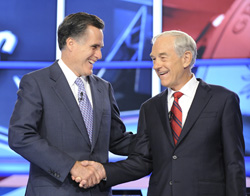 Just a few weeks ago, Barack Obama's re-election bid was beginning to look like an easy downhill jog. The daring raid that the president ordered delivered Osama bin Laden to the bottom of the Indian Ocean. Economic prospects looked brighter. Perhaps most helpfully, the Republican Party seemed to be indulging some kind of collective death wish, putting Donald Trump first in the polls and Rep. Paul Ryan's budget-cutting at the top of its legislative agenda. The GOP's early presidential skirmishing took place in a land of conservative make-believe, where tax cuts grow on trees and President Obama can be described as any sort of alien?foreign-born, Muslim, collectivist?that one chooses.
Just a few weeks ago, Barack Obama's re-election bid was beginning to look like an easy downhill jog. The daring raid that the president ordered delivered Osama bin Laden to the bottom of the Indian Ocean. Economic prospects looked brighter. Perhaps most helpfully, the Republican Party seemed to be indulging some kind of collective death wish, putting Donald Trump first in the polls and Rep. Paul Ryan's budget-cutting at the top of its legislative agenda. The GOP's early presidential skirmishing took place in a land of conservative make-believe, where tax cuts grow on trees and President Obama can be described as any sort of alien?foreign-born, Muslim, collectivist?that one chooses.
Obama's spring peak came at the White House Correspondents' Dinner in late April, when he jovially deflated Trump, while the Navy Seals were en route to Abbottabad. But since then, the political weather has turned less favorable. Unemployment rose to a politically treacherous 9.1 percent, while the Dow fell nearly 1,000 points from its peak. The odds of a serious economic aftershock to the Great Recession have risen. Most alarming, the Republican Party appears gradually to be going sane.
The GOP presidential field, while hardly dominated by political giants, appears far less outlandish than one might have predicted. At the first Republican debate in New Hampshire on Monday night, the seven candidates competed not for evangelical or libertarian favor, but for the status of someone plausible to compete with the president for swing voters.
Here are some of the things that did not happen in the debate. No one called Obama a socialist. No one gave ambiguous encouragement to the "birther" faction. While all of the candidates oppose gay marriage, no one bashed homosexuals. With the exception of the marginal former Pennsylvania Sen. Rick Santorum, no one directly endorsed the Ryan Plan. Two months ago, every Republican in the House backed this plan; now, no one wants to talk about it.
There were cringe-making moments, such as Herman Cain's assertion that sharia law is used in American courts, former House Speaker Newt Gingrich's seeming call for Muslim-Americans to swear loyalty oaths, and former Minnesota Gov. Tim Pawlenty's claim that America's founding documents describe it as a nation "under God" (neither the Declaration of Independence nor the Constitution uses this phrase). But overall, there was little of the usual thunder on the right. Gingrich has returned from the Greek cruise that prompted his staff to mutiny en masse perhaps excessively rested, wondering aloud about the absence of an American encampment on the moon. Even so, the Tea Party and former Alaska Gov. Sarah Palin, touchstones for the populist right, seemed like phenomena from a past era.
It was former Massachusetts Gov. Mitt Romney who held center stage, literally and metaphorically. As critics have alleged, Romney is something of a political weathervane. More precisely, he is a businessman, with an instinct for what product will sell at a given moment. Having evaluated the marketplace, he recognizes the demand for competence rather than ideology. Thus Romney now accuses Obama of failure, rather than leftism. He also does not repudiate his belief that human activity is causing climate change or his support for the legislation that his overhyped rival Pawlenty calls "Obamneycare." Instead Romney takes the coherent (if somewhat silly) federalist position that health-care reform ought to take place at the state level. Gingrich and Pawlenty, no more principled than Romney but with poorer political instincts, have simply boarded a train going in the wrong direction.
In the dynamic glimpsed last night, Romney is now running against Obama, while the other Republicans are running against Romney. The most credible challenge to the Republican front-runner is likely to come not from someone more conservative, but his coreligionist Jon Huntsman, the even more liberal former governor of Utah who is expected to announce his candidacy within the next week. Huntsman, who has in the past supported not only civil unions but Obama's stimulus spending, has expressed his intention to show "civility" not just toward his Republican rivals, but to the Democratic president he recently served as ambassador to China.
Primaries usually pull candidates to the margin, but the GOP is now experiencing a politically healthy course correction. Until recently the most evident forces were indeed pushing them away from the center. We are now seeing an opposite shift, away from then margin and toward the middle. For Obama, this movement, and the outbreak of Republican sanity it signals, is a worrying development indeed.
A version of this column also appears in the Financial Times.
Like Slate Politics on Facebook. Follow Slate on Twitter.
Source: http://feeds.slate.com/click.phdo?i=78c2f21dc30af54b4530a21b47855252
numerology testosterone emphysema phillip garrido sexting the economist dirk nowitzki
No comments:
Post a Comment
Note: Only a member of this blog may post a comment.